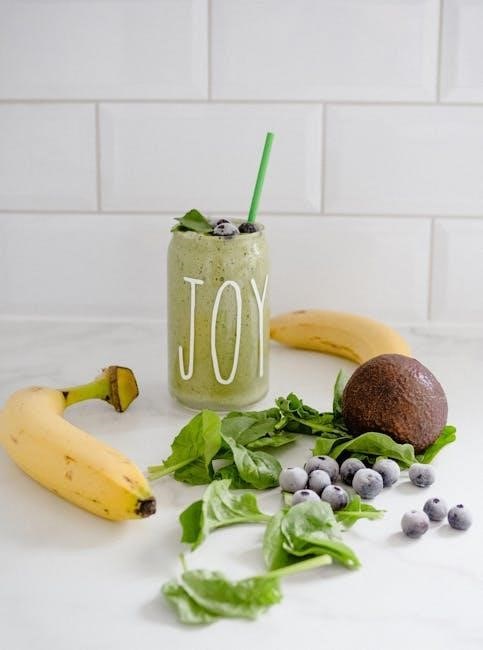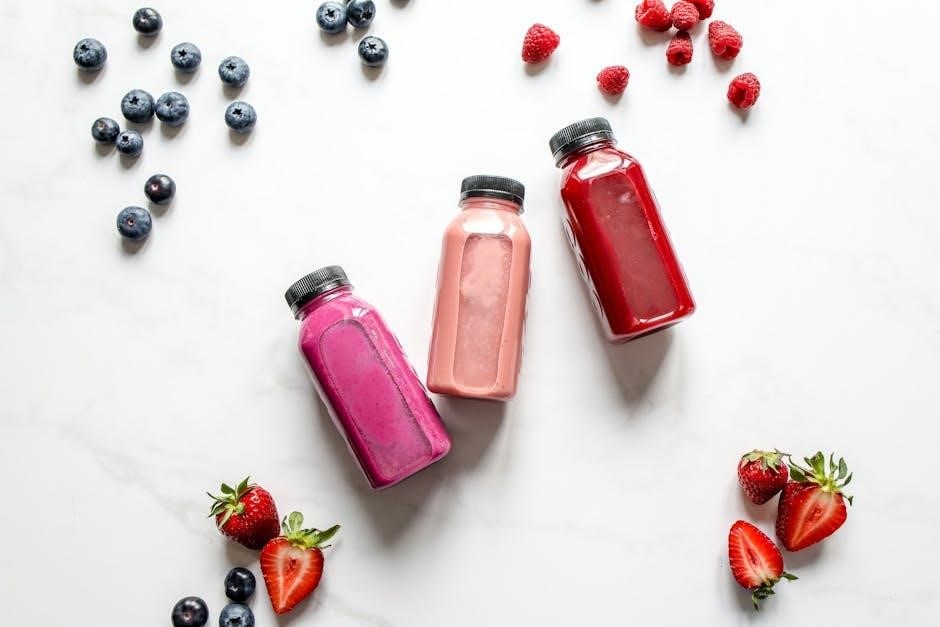The 21-Day Detox Diet Plan is a popular program promising weight loss and improved health through specific dietary changes․ It emphasizes cleansing the body in 21 days․
Overview of the 21-Day Detox Diet
The 21-Day Detox Diet is a structured program designed to help individuals cleanse their bodies and achieve weight loss in three weeks; It gained popularity through the best-selling book Lose 21 Pounds in 21 Days and is often referred to as the Martha’s Vineyard Diet Detox․ The plan focuses on specific dietary changes to promote detoxification and fat loss․ While some dieters report success, nutritionists have raised concerns about its nutritional adequacy, citing potential risks like muscle loss and fatigue․ Despite this, many people find the short-term approach motivating for kickstarting their health journey․
Key Objectives of the Diet Plan
The primary goal of the 21-Day Detox Diet is to help individuals lose up to 21 pounds in three weeks through a detoxification process․ It aims to eliminate toxins, reduce bloating, and reset metabolism․ The diet emphasizes clean eating by focusing on whole foods, lean proteins, and fiber-rich vegetables․ Another key objective is to break unhealthy eating habits and cravings, fostering a healthier relationship with food․ While the diet is popular, critics argue that rapid weight loss may not be sustainable and could lead to nutritional deficiencies․ Despite these concerns, many users report improved energy and mental clarity, making it a sought-after option for quick results․

Benefits of the 21-Day Detox Diet
The 21-Day Detox Diet promotes weight loss, improved energy, and mental clarity․ It helps reset metabolism, reduce bloating, and enhance overall well-being through targeted dietary changes․
Weight Loss and Body Cleansing
The 21-Day Detox Diet Plan is renowned for its potential to promote significant weight loss and cleanse the body of toxins․ By eliminating unhealthy foods and focusing on nutrient-rich alternatives, participants often experience a reduction in bloating and fat retention; The diet’s structured approach helps reset metabolism, supporting the body’s natural detoxification processes․ While some nutritionists raise concerns about the plan’s nutritional adequacy, adhering to the program’s guidelines can lead to noticeable improvements in body composition and overall health․ Many followers report feeling lighter and more energized, making it a popular choice for those seeking a structured path to weight loss and cleansing․
Improved Energy Levels and Mental Clarity
Many participants in the 21-Day Detox Diet Plan report enhanced energy levels and sharper mental clarity․ By eliminating processed foods, sugar, and other toxins, the body is able to function more efficiently, reducing fatigue․ The diet’s focus on whole, nutrient-dense foods helps stabilize blood sugar levels, preventing energy crashes․ Improved digestion and reduced inflammation also contribute to better mental focus and overall well-being․ While some critics argue that the diet may lack essential nutrients, adhering to its balanced approach can lead to these positive outcomes․ Users often describe feeling more alert and mentally clear, making the plan appealing for those seeking vitality and cognitive improvement․
Enhanced Digestive Health
The 21-Day Detox Diet Plan emphasizes the importance of improving digestive health by focusing on nutrient-rich foods and eliminating toxins․ By incorporating fruits, vegetables, and fiber-rich options, the diet promotes a healthy gut microbiome․ Many participants report reduced bloating, improved bowel regularity, and enhanced nutrient absorption․ The plan’s emphasis on whole foods helps reduce inflammation in the digestive tract, which can alleviate symptoms of irritable bowel syndrome and other digestive disorders․ While some critics argue the diet may lack certain nutrients, the focus on whole, unprocessed foods often leads to positive digestive changes, supporting overall well-being and long-term health benefits for many individuals․

Structure of the 21-Day Detox Plan
The 21-Day Detox Plan is structured into three phases—preparation, detoxification, and transition—guiding participants through dietary changes for gradual cleansing and improved well-being․
Preparation Phase: Setting Yourself Up for Success
The preparation phase of the 21-Day Detox Diet Plan is crucial for achieving success․ It involves understanding the diet’s principles, clearing your pantry of unhealthy foods, and stocking up on approved items․ This phase also includes planning meals, setting realistic goals, and mentally preparing for the detox journey․ Participants are encouraged to consult a healthcare professional, especially if they have medical conditions․ By laying a strong foundation, individuals can transition smoothly into the detox process and stay committed to their goals․ Proper preparation ensures a healthier and more sustainable experience throughout the 21 days․
The first week of the 21-Day Detox Diet Plan focuses on introducing core detox principles․ It begins with clearing out unhealthy foods and replacing them with nutrient-rich, approved items․ Participants are encouraged to focus on hydration, whole foods, and portion control․ Light exercises and stress-reduction techniques are also introduced to support the body’s natural cleansing process․ This phase helps the body adapt to the new diet and lays the foundation for the more intensive detoxification stages ahead․ By the end of this week, individuals typically notice initial improvements in energy and digestion, setting the stage for continued progress․
Day 8-14: Intensifying the Detox Process
During days 8-14, the detox process becomes more rigorous, focusing on deeper cleansing and accelerated weight loss․ The diet restricts additional food groups, such as whole grains and legumes, to minimize digestive strain․ Emphasis is placed on detox-friendly foods like leafy greens, cruciferous vegetables, and lean proteins․ Portion control becomes stricter, and raw foods, juices, and broths are prioritized․ Participants are encouraged to stay hydrated with herbal teas and detox drinks․ Supplements like probiotics or liver-supporting herbs may be introduced to enhance cleansing․ This phase also includes tips for managing potential plateaus and maintaining motivation as the body adapts to a cleaner, more efficient metabolism․
Day 15-21: Finalizing the Detox and Transitioning
Days 15-21 focus on concluding the detox and preparing for a sustainable transition․ The plan gradually reintroduces select foods to avoid shock to the system․ Participants are encouraged to maintain the core detox principles while diversifying their diet․ Emphasis is placed on whole, nutrient-rich foods like fruits, vegetables, and lean proteins․ Hydration and physical activity remain key to support the body’s recovery․ This phase also includes strategies to maintain weight loss and energy levels post-detox․ Participants are guided to monitor their progress and adjust their habits to ensure long-term benefits․ The final days aim to create a foundation for a healthier lifestyle beyond the detox period․

Nutritional Guidelines for the 21-Day Detox
The plan emphasizes whole, organic foods, eliminating processed items and sugars․ Focus on lean proteins, fruits, vegetables, and healthy fats․ Hydration and portion control are stressed․
Approved Foods and Drinks
The 21-Day Detox Diet Plan focuses on nutrient-dense, whole foods to support cleansing and weight loss․ Approved foods include lean proteins like chicken, fish, and tofu, as well as a variety of colorful fruits and vegetables․ Healthy fats such as avocados, nuts, and seeds are encouraged․ Whole grains like brown rice, quinoa, and oats are also permitted․ Herbal teas, green tea, and fresh vegetable juices are recommended for hydration․ Water intake is emphasized to aid detoxification․ Portion control and avoiding processed foods are key to maximizing the plan’s effectiveness․ These choices help maintain energy levels and support overall health during the detox period․
Foods to Avoid During the Detox
The 21-Day Detox Diet Plan requires eliminating certain foods to optimize cleansing and weight loss․ Restricted items include processed foods, refined sugars, alcohol, and caffeine, as they can hinder detoxification․ Avoiding saturated fats, red meat, and dairy products is also recommended to reduce toxin buildup․ Artificial additives, preservatives, and high-sodium foods should be avoided to promote healthier digestion and prevent bloating․ Staying away from these foods helps the body focus on cleansing and resetting its systems․ Adherence to these restrictions is crucial for achieving the diet’s goals of improved health and weight loss within the 21-day timeframe․

Tips for Staying Committed to the Plan
Stay committed by planning meals, setting realistic goals, and tracking progress․ Seek support from friends or online communities to maintain motivation throughout the 21-day journey․
Meal Planning and Grocery Shopping Strategies
Effective meal planning and strategic grocery shopping are essential for adhering to the 21-Day Detox Diet․ Start by creating a 21-day meal calendar, outlining breakfast, lunch, dinner, and snacks․ This helps avoid last-minute, unhealthy decisions․ Make a detailed grocery list featuring approved foods like fresh vegetables, fruits, lean proteins, and whole grains․ Shop the perimeter of the store, where whole foods are typically located, and avoid aisles filled with processed items․ Prepping meals in advance saves time and ensures compliance with the diet․ Consider batch cooking and portioning meals to maintain convenience and consistency throughout the detox period․
Handling Cravings and Challenges
Managing cravings and overcoming challenges is crucial during the 21-Day Detox․ Stay hydrated to reduce hunger pangs and maintain energy levels․ Keep healthy snacks like fruits and nuts readily available to curb sudden cravings․ Identify emotional triggers and find alternatives like meditation or exercise to satisfy them․ Plan ahead for social situations to avoid temptation․ Don’t be too hard on yourself if you slip—simply get back on track․ Share your journey with a friend or join a support group for accountability․ Track your progress to stay motivated and remind yourself of your goals․ Consistency is key to successfully navigating the detox period․
Safety and Considerations
The 21-Day Detox may not suit everyone, particularly those with health conditions․ Ensure nutritional balance and consult a healthcare professional before starting, especially if considering long-term use․
Who Should Avoid the 21-Day Detox
Certain individuals should avoid the 21-Day Detox, including those with chronic health conditions, the underweight, or those with a history of eating disorders․ Pregnant or breastfeeding women, as well as those requiring high-energy diets, should also avoid it․ The restrictive nature of the plan may lead to nutrient deficiencies or worsen health issues․ People with diabetes or heart conditions should exercise caution due to potential risks․ It’s crucial to prioritize health and consult a professional before starting such a program, especially if underlying health concerns exist․
Importance of Consulting a Healthcare Professional
Consulting a healthcare professional before starting the 21-Day Detox is crucial to ensure safety and suitability․ They can assess individual health needs and identify potential risks․ Detox plans may not be appropriate for everyone, especially those with chronic conditions or nutritional deficiencies․ A professional can help tailor the plan to avoid harmful side effects like muscle loss or fatigue․ They also provide guidance on maintaining proper nutrition and addressing underlying health issues․ Prioritizing professional advice helps maximize benefits while minimizing risks, ensuring the detox is done safely and effectively․ This step is vital for long-term health and wellness․
The 21-Day Detox Diet Plan offers a structured approach to cleansing and weight loss, but it’s important to balance benefits with caution and professional guidance․
Final Thoughts on the 21-Day Detox Diet
The 21-Day Detox Diet Plan is a structured program aimed at promoting weight loss and overall health through cleansing․ While it offers a clear roadmap for dietary changes, its effectiveness varies․ Some users report significant weight loss and improved energy, aligning with its promises․ However, critics highlight the lack of scientific evidence supporting detox diets, questioning their long-term benefits․ The plan’s restrictive nature may lead to nutrient deficiencies if not properly balanced․ Ultimately, it’s crucial to approach such diets with caution, ensuring they align with individual health goals and consulting a healthcare professional for personalized advice․
Next Steps After Completing the Plan
After finishing the 21-Day Detox Diet, focus on maintaining healthy habits to sustain results․ Gradually reintroduce foods while prioritizing whole, nutrient-rich options to avoid shocking your system․ Stay hydrated, continue mindful eating, and incorporate physical activity for long-term wellness․ Consider journaling your journey to track progress and identify patterns․ If weight loss slows, review your diet for areas to refine․ For lasting success, adopt a balanced lifestyle rather than extreme restrictions․ Consulting a nutritionist can help tailor your approach to prevent plateaus and ensure nutritional adequacy․ Remember, the detox is just the beginning—sustainable health requires ongoing effort and commitment․


